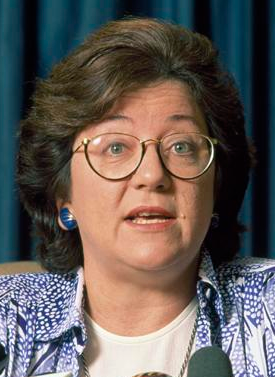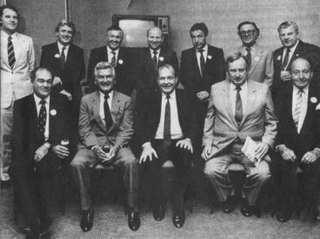Related Research Articles

Carmen Mary Lawrence is an Australian academic and former politician who was the premier of Western Australia from 1990 to 1993, the first woman to become the premier of an Australian state. To date she is the only woman premier of Western Australia. A member of the Labor Party, she later entered federal politics as a member of the House of Representatives from 1994 to 2007, and served as a minister in the Keating government.

Peter McCallum Dowding SC is an Australian lawyer and former politician who was the 24th Premier of Western Australia from 25 February 1988 until his resignation on 12 February 1990. He was a member of parliament from 1980 to 1990.

Colin James Barnett is an Australian former politician who was the 29th Premier of Western Australia. He concurrently served as the state's Treasurer at several points during his tenure and had previously held various other portfolios in Western Australia's Court–Cowan Ministry.

WA Inc was the name for a set of public-private partnerships in Western Australia in the 1980s associated with the Western Australian Development Corporation, which became a political scandal. The state government, which was led for much of the period by premier Brian Burke, engaged in business dealings with several prominent businessmen, including Alan Bond, Laurie Connell, Dallas Dempster, John Roberts, and Warren Anderson. These dealings resulted in a loss of public money, estimated at a minimum of $600 million and the insolvency of several large corporations.
James Andrew McGinty is an Australian former politician. He was a Labor member of the Western Australian Legislative Assembly from 1990 to 2009, representing the district of Fremantle. He was Labor Party leader and Leader of the Opposition from 1994 to 1996. He served as a minister, most notably as Attorney-General, in the governments of Carmen Lawrence, Geoff Gallop and Alan Carpenter.
Adele Farina is an Australian politician. She was a Labor Party member of the Western Australian Legislative Council from 2001 to 2021, representing South West Region. She served as parliamentary secretary to three different state ministers: the Minister for Planning and Infrastructure, Minister for Indigenous Affairs, Tourism, Culture and the Arts, and Minister for Disability Services, Citizenship, Multicultural Interests and Women's Interests.

Troy Raymond Buswell is an Australian former politician who was a Liberal member of the Western Australian Legislative Assembly from 2005 to 2014, representing the seat of Vasse. He was Treasurer of Western Australia in the Barnett Ministry from 2008 to 2010 and from 2012 to 2014, and also held several other portfolios.
Stanley John Halden, at Fremantle, Western Australia, is a former member of the Western Australian Legislative Council.

The 2008 Western Australian state election was held on Saturday 6 September 2008 to elect 59 members to the Legislative Assembly and 36 members to the Legislative Council. The incumbent centre-left Labor Party government, in power since the 2001 election and led since 25 January 2006 by Premier Alan Carpenter, was defeated by the centre-right Liberal Party opposition, led by Opposition Leader Colin Barnett since 6 August 2008.
The Lawrence Ministry was the 31st Ministry of the Government of Western Australia, and was led by Labor Premier Dr Carmen Lawrence and her deputy Ian Taylor. It succeeded the Dowding Ministry on 18 February 1990, following the resignation of Peter Dowding six days earlier following an open letter signed by a majority of the 47-member Labor caucus. The ministry was in turn succeeded by the Court–Cowan Ministry on 16 February 1993 after the Labor Party lost government at the state election held on 6 February.

Mia Jane Davies is an Australian politician who was the Leader of the Opposition and leader of the National Party in Western Australia from March 2021 to January 2023. She has been a member of the state Legislative Assembly since 2013, having previously served in the Legislative Council from 2009 to 2013. Davies was elected deputy leader of the Nationals in November 2013, and replaced Brendon Grylls as leader in March 2017 following his defeat at the 2017 state election. As a result of the Liberal Party's electoral wipeout at the 2021 state election, she became leader of the opposition after Premier Mark McGowan gave her party the official opposition party funding, the first member of her party to hold the role since Arthur Watts in 1947. She resigned as leader of the opposition and leader of her party in January 2023, and said she would not recontest her seat at the 2025 election.
Liza Mary Harvey is an Australian politician who was the Liberal Party member of the Legislative Assembly of Western Australia from 2008 to 2021, representing the seat of Scarborough. She was a minister in the government of Colin Barnett, and in 2016 was appointed deputy premier, becoming the first woman to hold the position. She became leader of the opposition after being elected unopposed to replace Mike Nahan as state Liberal leader on 13 June 2019. On 22 November 2020, she resigned as Liberal leader and was replaced by Zak Kirkup. She lost her seat at the 2021 election.
Elsie Kay Hallahan is a former deputy leader of the Western Australian branch of the Australian Labor Party.
David Charles Parker is an Australian former politician from Western Australia, serving as a minister in the Burke Ministry (1983–1988), then as Deputy Premier in the Dowding Ministry (1988–1990). He later served a jail term for perjury for evidence given to the WA Inc royal commission.
Barry John MacKinnon is a former Australian politician who was a Liberal Party member of the Legislative Assembly of Western Australia from 1977 to 1993. He was the state leader of the Liberal Party from 1986 to 1992, although he led the party at only one election. MacKinnon had earlier served as a minister in the governments of Sir Charles Court and Ray O'Connor. He worked as an accountant before entering politics, and since leaving parliament has involved himself in various community organisations.
Anthony Markham Trethowan was an Australian politician and Anglican minister who was a Liberal Party member of the Legislative Assembly of Western Australia from 1980 to 1986, representing the seat of East Melville.
Pamela Anne Beggs is a former Australian politician who was a Labor Party member of the Legislative Assembly of Western Australia from 1983 to 1993, representing the seat of Whitford.
Yvonne Daphne Henderson is a former Australian politician who was a Labor Party member of the Legislative Assembly of Western Australia from 1983 to 1996. She served as a minister in the governments of Peter Dowding and Carmen Lawrence.
Jeffrey Phillip Carr is a former Australian politician who was a Labor Party member of the Legislative Assembly of Western Australia from 1974 to 1991, representing the seat of Geraldton. He served as a minister in the governments of Brian Burke, Peter Dowding, and Carmen Lawrence.
The 1991 Floreat state by-election was a by-election for the seat of Floreat in the Legislative Assembly of Western Australia held on 20 July 1991. It was triggered by the resignation of Andrew Mensaros on 16 May 1991, due to ill health. He died before the by-election was held. The election was won by an independent candidate, Liz Constable, who finished with 58.94 percent of the two-candidate-preferred vote. Constable became the first woman to win election to the Parliament of Western Australia as an independent, and only the third woman overall to win a by-election.
References
- ↑ "Chronology". The Canberra Times . Vol. 71, no. 22, 126. Australian Capital Territory, Australia. 15 November 1995. p. 4. Retrieved 14 May 2023– via National Library of Australia.
- ↑ "WA Govt sets up Easton inquiry". The Canberra Times . Vol. 70, no. 21, 937. Australian Capital Territory, Australia. 10 May 1995. p. 3. Retrieved 14 May 2023– via National Library of Australia.
- ↑ Trioli, Virginia (3 August 1999). "The fight of her life". The Bulletin . pp. 32–36.
- ↑ Goodwin, H, Stewart, A and Thomas, M. (1995) Imprisonment for contempt of the Western Australian Parliament. University of Western Australia Law Review, Vol. 25, no. 1 (July 1995), pp. 187-200. (Uses the Easton Affair as an example.)
- ↑ "Acquittal decision brings Lawrence saga to an end". ABC 7:30 Report (transcript). 23 July 1999. Archived from the original on 30 May 2016. Retrieved 26 June 2008.
- ↑ "Carmen Lawrence acquitted". ABC Radio, PM programme (transcript). 23 July 1999. Retrieved 26 June 2008.
- ↑ "'No regrets' as Lawrence quits politics". thewest.com.au. 29 March 2007. Retrieved 26 June 2008.[ permanent dead link ]